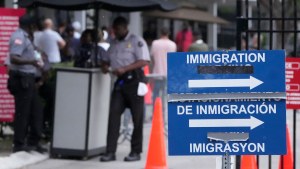Of the eight policies included in a Council-Ipsos survey, not one is supported by a majority of both parties.
Some recent surveys have found that immigration has climbed over the past year as an important problem facing the United States, with a February Gallup poll showing it as Americans’ most frequently mentioned important problem. A joint Chicago Council on Global Affairs / Ipsos survey, conducted April 5-7, 2024, finds that immigration is growing as a national concern. Prevously a Republican concern more than Democratic, moderate Democrats are focusing on the issue as well. But a shared focus doesn’t mean partisans agree on a path forward for US policy: of the eight policies asked about in the survey, not one is supported by a majority of both Republicans and Democrats.
Key Findings
- A majority of Americans (54%) say that “controlling and reducing illegal immigration” should be a very important foreign policy goal for the United States, up from a previous all-time low of 42 percent in 2018.
- Nearly nine in 10 Republicans (86%) view this as an important goal for the United States—an all-time high in Council polling—while only a third of Democrats (34%) say the same.
- Partisans are deeply divided on immigration policies. Of the eight different policies asked about in this survey, not one is supported by a majority of both Republicans and Democrats.
- Republicans support increased deportations (89%), an expanded border wall with Mexico (87%), and increased penalties on businesses for hiring people without legal work authorization (85%).
- But there are differences among Republican supporters. Non-Trump Republicans favor measures to facilitate people fleeing violence to legally immigrate (63%, vs. 38% of Trump Republicans). They also favor attempts to extend temporary visas to so that immigrants can legally stay in the United States (54%, vs. 30% of Trump Republicans). ‘
- Democrats broadly favor policies that make it easier for immigrants to legally come to, and stay in, the United States. But moderates (55%) more than liberals (24%) see controlling and reducing immigration as a priority.
- Moderate Democrats also support imposing greater penalties on businesses that hire without legal work authorization (68% vs. 40% liberals), increasing deportations (64% vs. 37%), and expanding the border wall and fence along the US-Mexico border (56% vs. 15%).
Americans Now More Likely to Prioritize Controlling, Reducing Illegal Immigration
A majority of Americans (54%) say that controlling and reducing illegal immigration should be a very important foreign policy goal for the United States.1 This represents a notable increase from 2018, when a record low of 42 percent of Americans said the same. That shift reflects growing concern among both Republicans and Democrats, though the two groups approach the issue with very different levels of urgency.
Since 2002, Democrats have been consistently less likely than Republicans to say that controlling and reducing illegal immigration is a very important goal for US policy. And while a large partisan gap remains between the two, Democrats are more likely now than they were six years ago to view the issue as a very important policy goal for the country (34%, up from 20% in 2018).
For Republicans, controlling and reducing illegal immigration has always been a very important goal. And over the past decade, Republicans have steadily become even more likely to say so. Today 86 percent of Republicans view controlling and reducing illegal immigration as a very important goal for the country, up from 61 percent in 2014.
Republicans, Democrats Starkly Divided over Immigration Policies
Reflecting longstanding trends in public opinion on immigration issues, American views on immigration policy continue to be defined by stark partisan differences. Perhaps the clearest sign of this division: of the eight different policies asked about in this survey, not one receives majority support from both Democrats and Republicans. Only two policies come close, each strongly favored by one party while the other party is divided on the issue. One is imposing increased penalties on businesses for hiring staff without legal work authorization, which Republicans overwhelmingly support (85%) while Democrats are divided on the issue (48% support, 49% oppose). The other is making it easier for people fleeing violence in their home countries to legally immigrate to the United States. Most Democrats (84%) support this policy, while Republicans are divided (49% support, 50% oppose).
Republicans broadly favor punitive approaches to immigration policy, such as increasing deportations of people who are in the country illegally (89%) and putting more severe penalties on business for hiring people without legal work authorization (85%). Expanding the 700 miles of border wall and fencing with Mexico is also a very popular policy among Republicans (87% support), and as the 2023 Chicago Council Survey found, majorities of Republicans (79%) favor using US troops to stop immigrants from coming into the US from Mexico. Finally, Republicans are divided over whether the US should make it easier for people fleeing violence in their home countries to legally immigrate to the United States, with similar proportions supporting (49%) and opposing (50%) such a policy.
Democratic preferences are strikingly different. Large proportions of Democrats support policies aimed at improving and expanding the ability of immigrants to legally enter the United States and to stay here if they already live in the country. This is as true for immigrants who currently lack legal status (80%) as for those who currently hold a valid visa (79%). Democrats also strongly support creating a pathway for immigrants currently in the country illegally to acquire US citizenship (85%), a core element of various immigration reform efforts over the past 15 years.
When it comes to more punitive approaches to immigration, Democrats are less supportive. Democrats are divided over whether to impose more severe penalties on businesses for hiring workers without legal work authorization (48% support, 49% oppose). And majorities of Democrats oppose increased deportations (53% oppose) or expanding the existing border wall and fencing along the US-Mexico border (69% oppose).
Republicans’ Intraparty Divisions on Immigration
While immigration is an important issue for Republicans, it is only partly a unifying one. As past Council analyses have found, Republicans are divided on immigration between Trump Republicans (Republicans with a very favorable view of former President Donald Trump) and non-Trump Republicans (Republicans with a somewhat favorable, somewhat unfavorable, or very unfavorable view of Trump).
There are some core areas of agreement across the party. Large majorities of both Trump Republicans (95%) and non-Trump Republicans (77%) say that controlling and reducing illegal immigration is a very important goal for the United States. And the two groups agree on several key sets of policies, with large majorities of both groups supporting expanded border wall and fencing along the US-Mexico border, increased deportations of people in the country illegally, and more severe penalties for businesses who hire people without legal work authorization.
However, non-Trump Republicans are also more supportive of other immigration policy approaches. Majorities of non-Trump Republicans support making it easier for people fleeing violence in their home countries to legally immigrate to the United States (63%, vs. 38% of Trump Republicans). And non-Trump Republicans say the United States should make it easier for immigrants on temporary visas to legally stay in the United States (54%, vs. 30% of Trump Republicans).
Moderate Democrats More Supportive of Punitive Approaches
Past Council analyses have also found that Democrats, too, are somewhat divided internally over immigration policy. However, those divisions are over different policies than they are for Republicans, reflecting their party’s different approach to the issue.
Across ideological lines, Democrats support many policies which deal with either the future flow of immigrants to the United States or the millions of undocumented immigrants already living in the United States. Self-identified Democrats who are ideologically liberal are more likely to favor many of these policies—such as establishing a way for immigrants in the country illegally to stay legally (87%) or creating a pathway to citizenship for those immigrants (90%)—but moderate and conservative Democrats also support these policies in large numbers (68% and 74%, respectively). Similarly, Democrats across ideological lines support increasing the number of people allowed to legally immigrate to the United States (80% liberals, 63% moderates). And both groups of Democrats want to make it easier for immigrants with visas to legally stay in the United States and for people fleeing violence in their home countries to legally immigrate to the United States (88% liberals, 75% moderates).
Where Democrats differ is on the more punitive policies generally supported by Republicans. Among those Democrats who identify as ideologically moderate or conservative, majorities support imposing greater penalties on businesses for hiring staff without legal work authorization (68%), increasing deportations (64%), and expanding the border wall and fence along the US-Mexico border (56%). Majorities of liberal Democrats, by contrast, oppose all these policies. Moderate Democrats are also more likely to view controlling and reducing illegal immigration as a very important US policy goal (55%, compared to just 24% of liberal Democrats).
Conclusion
As Council polls have tracked, American attitudes on immigration have steadily diverged along partisan lines over the past two decades. Today, those partisan differences encompass the full range of immigration policy, including border policy, future flows of immigration, and how to handle the millions of undocumented immigrants already living in the United States. Yet divisions over immigration policy don’t just exist between the parties—they also exist within the parties.
As our polling shows, Trump Republicans are deeply opposed to a core pillar of the comprehensive immigration reform efforts that have been attempted over the past two decades: establishing a way for undocumented immigrants currently in the country to stay in the United States and/or acquire US citizenship. By contrast, other Republicans are more divided on that policy, and more open to making immigration to the United States easier for those fleeing violence in their home countries. At the same time, Democrats are also internally split between their liberal and moderate wings. Moderate Democrats support many of the policies most embraced by Republicans even as a large majority of liberals oppose them. Those internal divisions could provide the necessary crossover for a future immigration reform coalition—or make the task of immigration policy reform even harder to achieve.
- 1The Council uses the term “illegal immigration” here because it is wording used in past surveys, and using the same language is necessary in order to accurately compare results.
This analysis is based on data from a joint Chicago Council on Global Affairs / Ipsos survey. It was conducted April 5-7, 2024 by Ipsos using its large-scale, nationwide, online research panel, KnowledgePanel, among a weighted national sample of 1,021 adults 18 or older living in all 50 US states and the District of Columbia. The margin of sampling error for the full sample is ±3.3 percentage points including a design effect of 1.17. The margin of error is higher for partisan subgroups: ±6.3 points for Republicans, ±5.8 points for Democrats, and ±5.1 points for Independents.
The data for the total sample were weighted to adjust for gender by age, race/ethnicity, education, Census region, metropolitan status, and household income using demographic benchmarks from the 2023 March Supplement of the Current Population Survey (CPS). Specific categories used were:
- Gender (Male, Female) by Age (18–29, 30–44, 45-59 and 60+)
- Race/Hispanic Ethnicity (White Non-Hispanic, Black Non-Hispanic, Other, Non-Hispanic, Hispanic, 2+ Races, Non-Hispanic)
- Education (Less than High School, High School, Some College, Bachelor or higher)
- Census Region (Northeast, Midwest, South, West)
- Metropolitan status (Metro, non-Metro)
- Household Income (Under $25,000, $25,000-$49,999, $50,000-$74,999, $75,000-$99,999, $100,000-$149,999, $150,000+)
In this survey of the overall US public, 26 percent of respondents self-identify as Republican Party supporters. For the purposes of this analysis, “Trump Republicans” refers to those Republican Party supporters who express a very favorable opinion of Donald Trump (53% of overall Republicans, 14% of the public overall). Non-Trump Republicans are those who express only a somewhat favorable or unfavorable view of the former president (47% of overall Republicans, 12% of the public overall). The proportion of Republicans who hold a very favorable view of him has varied over time, with generally just over half of self-identified Republicans holding a very favorable view of Trump (see below figure).
In this survey, 31 percent of respondents self-identify as Democratic Party supporters. Among those self-identified Democrats, 67 percent report that they think of themselves as being extremely liberal, liberal, or slightly liberal, while 33 percent report that they think of themselves as being moderate, slightly conservative, conservative, or extremely conservative. The proportion of Democrats who see themselves as some type of liberal has increased over the past two decades, though this poll has a notably higher proportion of liberal Democrats than other recent Chicago Council-Ipsos polls.



Related Content
 Public Opinion
Public Opinion
But Republicans and Democrats are sharply divided when it comes to immigration levels.
 US Foreign Policy
US Foreign Policy
Republicans with very favorable views of Trump are more likely than other GOP backers to support deportations for undocumented immigrants.
 Public Opinion
Public Opinion
Cleavages within the party could further complicate President Joe Biden's path to reelection.
 Public Opinion
Public Opinion
Political affiliation is far more closely associated with immigration policy preferences than race or ethnicity, polling finds.
